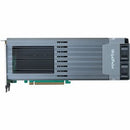Description
HighPoint SSD7749M PCIe 4.0 x16 / 8x 22110 M.2 Ports
The HighPoint SSD7749M represents a leap forward in industrial-grade storage acceleration, delivering PCIe 4.0 Gen4 x16 bandwidth to an eight-channel M.2 NVMe RAID architecture. Engineered for harsh environments and demanding workloads, this RAID controller card excels at dense storage deployments in edge data centers, industrial servers, and high-throughput surveillance systems. With support for eight 22110 M.2 drives, it consolidates multiple NVMe SSDs into a single, manageable storage pool while preserving enterprise-class reliability, low latency, and sustained performance under continuous workloads. The SSD7749M is purpose-built for applications where space is at a premium and storage density must scale without compromise—perfect for network edge devices, IoT gateways, and compact data centers that require robust analytics, caching, and high-speed data capture. Its architecture emphasizes not only raw speed but also durability, thermal stability, and long-term availability in 24/7 operation scenarios, making it a trusted backbone for modern storage infrastructures.
- The blistering performance of PCIe Gen4 x16 combined with an 8-channel M.2 NVMe RAID controller unlocks multi-drive throughput capable of handling data-heavy workloads such as real-time analytics, AI inference, high-resolution video processing, and large-scale backups. This controller is designed to push sustained bandwidth across all eight NVMe channels, enabling parallel read and write operations that dramatically reduce bottlenecks in data-intensive environments.
- 8-channel M.2 NVMe RAID architecture enables high-density storage consolidation in a compact form factor. By leveraging eight independent 22110 NVMe ports, the SSD7749M supports scalable RAID configurations and efficient data distribution across drives, delivering improved random IOPS, low latency, and predictable performance in edge and industrial deployments where space is at a premium.
- Enterprise-grade reliability for 24/7 operations. The SSD7749M is engineered to maintain consistent performance under continuous load, with thermal management, robust power delivery, and fault-tolerant features that minimize downtime in mission-critical applications. This reliability translates to higher system uptime, reduced maintenance windows, and improved overall total cost of ownership for ruggedized storage infrastructures.
- Streamlined integration and deployment. The HighPoint design prioritizes ease of system integration in tight rack spaces and embedded environments. The card is engineered for straightforward installation in servers and workstations with PCIe Gen4 support, complemented by managed software that simplifies RAID configuration, health monitoring, and firmware updates—helping IT teams accelerate project delivery and minimize operational complexity.
- Versatile compatibility with modern storage ecosystems. The SSD7749M supports a broad range of NVMe drives in 22110 form factor, enabling high-capacity configurations with premium endurance. This makes it suitable for diverse workloads—from data deduplication and virtualized storage to media editing pipelines and surveillance ecosystems—without sacrificing performance or reliability.
Technical Details of HighPoint SSD7749M
- UPC/SKU: Not provided in product data. Obtain from ec.synnex with your purchase order to pull exact specifications and confirm compatibility with your system configuration.
- Note: Exact bandwidth, latency characteristics, RAID level support, and management features should be verified against the official specifications from the sourcing distributor to ensure alignment with your deployment requirements.
How to install HighPoint SSD7749M
- Power down the host system completely and disconnect all power sources. Ground yourself to prevent electrostatic discharge (ESD) before handling any components.
- Open the chassis and locate a suitable PCIe slot. The SSD7749M requires a PCIe Gen4 x16 slot to achieve full performance; ensure there is enough clearance for the card’s height and length in your server or workstation.
- Remove the slot cover if needed and insert the SSD7749M into the PCIe x16 slot with firm, even pressure. Secure the bracket to the chassis using the provided screws to prevent vibration and ensure a solid mechanical connection.
- Prepare your M.2 drives. Install each 22110 NVMe SSD into the eight dedicated ports on the SSD7749M, applying even torque to the drive screws. Confirm that drives are seated properly and that any anti-tamper or locking mechanisms are engaged to maintain reliability under vibration or heat exposure.
- Close the chassis, reconnect all power and data interfaces, and boot the system. Enter the system BIOS or the HighPoint RAID management utility to initialize the card, configure RAID arrays, assign drive mappings, and install any required drivers or software. Run a post-install health check to verify drive status, temperatures, and array readiness before placing the system into production.
Frequently asked questions
- What is the SSD7749M? The SSD7749M is an industrial-grade PCIe 4.0 x16 RAID controller card that manages eight independent 22110 M.2 NVMe drives. It is designed to deliver high-density, low-latency storage for edge servers, industrial systems, and other environments that demand reliability and speed in a compact footprint.
- How many NVMe drives does it support? It supports eight 22110 M.2 NVMe drives across eight channels, enabling expansive storage pools and high parallelism for demanding workloads while maintaining efficient data distribution across drives.
- Is it suitable for 24/7 operation? Yes. The SSD7749M is engineered for continuous operation in enterprise and industrial contexts, featuring robust thermal management, power delivery, and reliability mechanisms designed to minimize downtime and sustain performance under sustained loads.
- Do I need specialized software? HighPoint provides management software and drivers to configure RAID arrays, monitor drive health, and optimize performance. Ensure the management tools support your operating system and integrate with your existing monitoring stack.
- Which RAID levels are supported? The SSD7749M supports multiple RAID configurations commonly used in NVMe RAID controllers. The exact RAID level options are best confirmed via the official specifications from the distributor, as capabilities can vary by firmware and software version. Plan your deployment based on desired performance, redundancy, and capacity.
Customer reviews
Showing - Of Reviews


